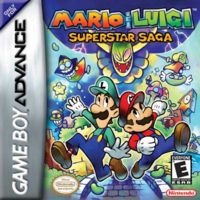Mario & Luigi: Superstar Saga

| |
| Mario & Luigi: Superstar Saga | |
| Full Title | Mario & Luigi: Superstar Saga |
| Developer | AlphaDream |
| Publisher | Nintendo |
| System | Game Boy Advance, Wii U Virtual Console |
| Release Date | Game Boy Advance JP November 11th, 2003 US November 17th, 2003 EU November 21st, 2003 Wii U Virtual Console US/EU April 3, 2014 JP April 30, 2014 |
| Genre | Adventure/RPG |
| Gallery | GH Gallery |
| Rating | ESRB: E |
Mario & Luigi: Superstar Saga (known in Japan as simply Mario & Luigi RPG) is the third Mario RPG and the first handheld one, which features a unique graphical and gameplay style. Like Paper Mario, this game spawns its own subseries. As the title implies, this game features simply Mario and Luigi working together in their first adventure since the Super NES days, on an adventure to the exotic Beanbean Kingdom in pursuit of the evil witch Cackletta.
Story[edit]
Peach and Toadsworth are greeting a peaceful envoy from Beanbean Kingdom, when suddenly things turn foul and it turns out that is in fact the evil Cackletta, there to steal Peach's voice (and subsequently replace it with explosive sound). Upon finding out, Mario sets out with Bowser to fix the Princess's voice, with Luigi getting forced along unwillingly. Their flight is interrupted by Fawful and Cackletta, so the two plumbers are left stranded in the mountains of Beanbean Kingdom and have to work together to find a way to save the princess.
Gameplay[edit]
The gameplay style is simple; outside of battle the A button controls the brother in front while the B button controls the brother in back, and the brothers switch places with the Select button. Within battle Mario is controlled by the A button while Luigi is controlled with B. The battles take timed attacks to a whole new level; Mario can jump up to dodge an enemy's attack, and if he jumps at the right moment he'll hit the opponent and cause damage. There are also various other sets of siblings Mario and Luigi meet, who teach you special Brother Actions to use outside of battle and Brother Attacks to use within battle.
With the unique system, there are also elements of the other Mario games. Various references to past Mario games are made as old friends and enemies appear along with the new ones. There is now special clothing as in the original "Super Mario RPG: Legend of the Seven Stars" along with the badges from "Paper Mario".
Humor[edit]
One of the most obvious aspects of the game is its attention to humor, now with an emphasis on this aspect far more than what was done by Paper Mario and Super Mario RPG. Like in all the other games, Mario and Luigi are mute save for voice clips of common phrases and unintelligible gibberish. Other humorous bits are jabs at Luigi being neglected, the pretty boy Prince Peasley enveloping the screen in a white flash whenever he twirls his hair, and of course there's Fawful- Cackletta's grammatically-challenged hyperactive henchman, who quickly became a fan favorite. Many characters and location in the game are also named after synonyms for laughter.
Continuity Notes[edit]
- Woohooniversity contains a room filled with types of ? blocks used in previous Mario games. The blocks shown are from Paper Mario, Super Mario 64, Super Mario Bros. and Super Mario World
- A doll of Geno from Super Mario RPG appears as the host of the Shoom Stache minigame.
- The Koopalings make their first appearance since Bowser Jr.'s introduction in Super Mario Sunshine.
- Kamek appears as Psycho Kamek in Little Fungitown. However, there are no references to his previous encounters with the Mario Bros., and due to Kamek and the generic Magikoopas both having the same Japanese name, it is possible that this is a different Magikoopa.
- E. Gadd appears and references the events of Luigi's Mansion, and he also presents improved versions of his inventions from the game; one of the game's ghosts also makes an appearance.
- The viruses from Dr. Mario appear as enemies in Woohooniversity, which marks a rare acknowledgment of Dr. Mario within other Mario games.
Legacy[edit]
This started the Mario & Luigi subseries which has spawned a variety of sequels across Nintendo's handheld systems. The series would also later crossover with the Paper Mario games in the 2015/2016 installment known as Mario & Luigi: Paper Jam.
Ports/Remakes[edit]
- In 2014, it was released for download on the Wii U as part of the Wii U Virtual Console.
- In 2017, it was remade for the Nintendo 3DS as Mario & Luigi: Superstar Saga + Bowser's Minions. This version featured updated graphics and gameplay, as well as a new side game known as Minion Quest: The Search for Bowser. The new mode starred one Captain Goomba leading a group of Bowser's minions in a quest to find and save the Koopa King during the events of the main game.
- In February 2023, the original version of the game was among the first wave of the Game Boy Advance games made available on the Nintendo Switch for subscribers of the Nintendo Switch Online's Expansion Pack program.
Sequels[edit]
In 2005, AlphaDream released a follow up on the Nintendo DS titled Mario & Luigi: Partners in Time.
See Also[edit]